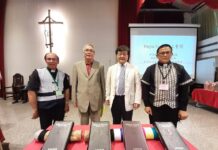PCT churches reach out to outcasts during Christmas
Reported by staff reporters
Summarized by Lydia Ma
Sharing the gospel with the sick
As the world celebrates Christmas with lots of laughter and lots of friends, there is a group of people whose Christmas is a lonely one. These folks – 10 adults, 3 youths, and 10 infants – have two things in common: They are HIV-positive and homeless.
According to Garden of Mercy Foundation CEO Chiu Shu-mei, only 4 of these 23 patients have family members who come and visit them occasionally. The rest have literally been forsaken by their own families and they need our compassion and care.
To help us understand, Chiu shared with TCN the story of an elderly woman. This lady discovered she had AIDS after a stroke landed her in a hospital. The first year the woman lived in Home of Mercy (a residence run by Garden of Mercy for adults and youths with HIV who’ve been abandoned and need professional care), her family would visit her occasionally. The following year, her family visited her 2 or 3 times. After that, her family never visited again. Though the woman eventually tried calling her son, the voice on the other side of the line was cold and aloof. With time, the woman stopped speaking to people altogether, though she often will find a secret place to hide and cry.
Aware of the plight people with AIDS face because they’re still ostracized by society, many business organizations’ leaders have in recent years visited Home of Mercy during holidays or sent volunteers. Visitors will sing and dine with residents and try to make them smile and feel less lonely and miserable, even if only for a little while.
Sharing the gospel with the forsaken
In another part of Taipei, Chang-Yi, an elderly man in his 70s wearing a navy-blue military uniform, recounts how he came to Taiwan with the KMT army back in 1948 as an 11-year-old boy duped by grownups into coming to Taiwan with them with the promise that he’d get to see a great movie.
Chang was discharged from the military in 1972 and suffered a stroke in 1989 due to work-related stress. He never got married and has since wandered the streets of Taipei without employment. He almost died of exposure once but was saved by paramedics.
Until recently, Chang spent his days and nights inside the corridors of Taipei Train Station as a homeless man.
Chang said he once considered returning to China and boarded a plane to go home. But when he arrived to his hometown, he realized everything had changed and his relatives weren’t exactly thrilled to see or entertain him. He returned to Taiwan soon afterwards.
Because of his stroke, Chang’s speech is slurred, “I don’t have a home,” he said. “I wasn’t born in Taiwan. When I returned to my homeland, I found out that everything had become foreign to me.”
“But I’m grateful that the church accepts and welcomes me. The church is my home now,” he said, recalling that his days as a wanderer often meant going several days without a bath and his body scent would often scare people away. As result, no one was willing to offer him a place to stay the night.
But Christians and churches have welcomed him, given him a good bath, washed his clothes, and have even admonished him not to wander outdoors anymore. All of these gestures have gone a long way in comforting his lonely heart.






